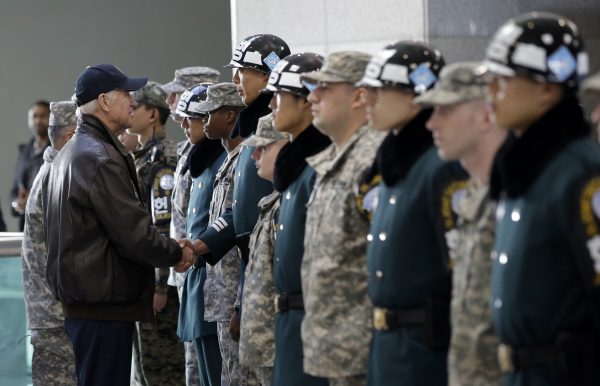This disconnect could exacerbate ongoing differences between South Korea and the United States despite the incoming Biden administration’s plans to restore relations.
Revitalising the South Korea–US alliance — the so-called ‘linchpin’ of the United States’ Indo-Pacific strategy — will be a priority for an administration that must otherwise focus primarily on domestic issues. President-elect Joe Biden has explicitly stated his belief in the importance of the alliance, which complements the views of senior lawmakers.
This contrasts with the situation under the Trump administration, whose policies toward the Korean Peninsula sometimes caused friction between the White House and the legislature. In particular, Donald Trump’s insistence that Seoul pay a significantly increased amount of defence cost-sharing drew concerns from lawmakers over the damage such demands were causing the alliance.
Over the past four years, lawmakers on Capitol Hill have acted to shore up the South Korea–US defence partnership to counteract Trump’s unmasked scepticism towards the alliance. Congress passed several resolutions asserting Washington’s support for the alliance. The amount and nature of such legislation is notable compared to those passed under the Obama administration, when most Korea-related legislation pertained to North Korean security provocations or commemorative events of importance to the South Korea–US relationship.
The US legislature also passed laws related to the Indo-Pacific strategy, such as the Asia Reassurance Initiative Act of 2018 and the most recent National Defense Authorization Act. The latter in particular, likely a response to prospects for unilateral US troop withdrawals from South Korea, places hefty conditions on the White House’s ability to reduce US force levels in South Korea. Indeed, Trump vetoed the bill in part because of the restrictions, although Congress subsequently overrode the veto.
The Biden administration’s plans to reinvigorate the alliance will be welcome news to Congress. But despite anticipation for closer alignment between the US executive and legislature, South Korea does not view the alliance in the same manner as the United States. This is particularly true because of the challenges that China–South Korea ties pose for the Seoul–Washington partnership.
A significant aim of the aforementioned laws is to shore up Washington’s position against the rise of China. The United States is seeking South Korea’s participation in multilateral groupings such as the Quadrilateral Security Dialogue that are designed to promote Washington’s ‘free and open Indo-Pacific’ worldview. Yet South Korea, whose relationship with China has been on the mend since bilateral ties chilled in 2016–17, has not been willing to fully come down on the United States’ side in its Indo-Pacific strategy.
To be sure, practically no recent US legislation explicitly labels China as a challenger to the South Korea–US alliance itself, despite Seoul agreeing to limit its security cooperation with the United States in exchange for China halting its anti-THAAD sanctions (the so-called ‘three no’s’). Yet with recent legislation fostering US strategic efforts against China and ascribing to the South Korea–US alliance a function beyond its original mandate of maintaining South Korea’s security, lawmakers in Washington run the risk of attempting to take the relationship in a direction that Seoul is not fully on board with.
South Korea must define the nature of its relationships with China and the United States in a way that will avoid misunderstandings between Beijing and Washington. The key here is how South Korea can simultaneously maintain a military alliance with the United States and a strategic partnership — with a heavy focus on economic ties — with China.
South Korea itself is all too aware that both Beijing and Washington hope to have Seoul unequivocally on their sides in their respective bids for dominance in the Indo-Pacific. Given that South Korea is a keystone of US strategy in the region, strengthening relations between Beijing and Seoul at the expense of South Korea–US ties is a priority for Chinese foreign policy.
There is room to argue that China’s goal is to strengthen relations with South Korea rather than exerting pressure on Seoul. Still, there is no doubt that China’s bid to shore up ties with South Korea occurs in the shadow of the burgeoning China–US strategic rivalry. In this regard, South Korean policymakers have advocated for a multilateral approach to Indo-Pacific issues, as opposed to outright alignment with the United States in opposition to China. A recent internal report from South Korea’s National Assembly Research Service further asserts that Seoul must re-evaluate the direction of its alliance with the United States.
It is premature to say definitively that South Korea is tilting toward China at the expense of the United States. Still, the United States’ optimistic Korea policy may not reflect the realities facing the alliance, and the prospects for greater cohesion across the US government on South Korea does not necessarily mean that the alliance itself is on the up.
Anthony V Rinna is Senior Editor at the Sino-NK research group.

